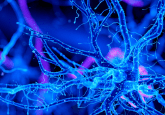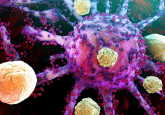Researchers shine a light on cancer diagnosis

A team of scientists from the University of Bradford (UK) have recently published work on an assay that has implications in cancer diagnosis. The test, termed the Lymphocyte Genome Sensitivity (LGS) assay, examines white blood cells, and could differentiate between healthy patients and those with cancer.
Under cancerous conditions, white blood cells are under stress, acting as part of the body’s defence system. The team therefore hypothesized that such white blood cells would be more sensitive to any further DNA damage, and could therefore be used as a biomarker for cancer.
The team compared blood samples from patients suffering from cancer to healthy controls, blasting the white blood cells with UV light. They then measured the degree of DNA damage using a ‘modified comet assay’. In this assay, DNA is pulled towards the positive end of an electric field, resulting in a ‘comet-like tail’ being observed. For cells with more DNA damage, a longer tail can be observed.
In total, the team assayed 208 samples – from patients with melanoma (20), colon cancer (34), lung cancer (4), suspected melanoma (18), polyposis (28), COPD (10) and healthy controls (94). The researchers found that DNA was more easily damaged in patients with cancer; and could thus differentiate between healthy patients and patients with cancer or pre-cancer.
Although the sample size was small, the scientists identified significant differences between the three groups – with P<0.001. The team envisage the LGS assay being used to rule out cancer, thus avoiding further invasive procedures, in addition to playing a part in diagnosing difficult-to-detect cancers.
This initial research was recently published in the FASEB Journal. Looking to the future, the team are now conducting a clinical trial with the LGS assay. They are assessing the effectiveness of the assay in diagnosing colorectal cancer, in terms of predicting whether patients would benefit from a colonoscopy.
Source: Anderson D, Najafzadeh M, Gopalan R et al. Sensitivity and specificity of the empirical lymphocyte genome sensitivity (LGS) assay: implications for improving cancer diagnostics. FASEB J. DOI: 10.1096/fj.14-254748 (2014) (Epub ahead of print).





